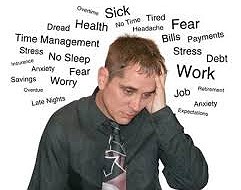Stress, anxiety and panic attacks are becoming more and more of a common term in modern-day society. Claiming to be ‘stressed’ regularly is easily disregarded by family and  peers, but it shouldn’t be.
peers, but it shouldn’t be.
Stress has a detrimental impact on mental health, physical health and one’s abilities to complete seemingly simple day-to-day tasks.
The symptoms of stress vary per person. One may feel light headed and experience nausea, while another may be consistently irritated and suffering insomnia.
The multiple symptoms of stress make it hard for a medical professional to diagnose stress, so it is important that an individual can recognise the signs of stress within themselves and address them accordingly. There are 7 main ways to deal with stress proactively.
1. Take a break
Life is busy and it is becoming increasingly harder for people to find ‘me’ time. Constant screens, work emails and a digital world make it difficult to switch off. Whether it’s one hour per day or 2 hours per week, it’s important to allocate personal time to switch off from the world.
2. Get active
An exercise class, yoga, a simple stroll in the park or even brief meditation sessions are sure fire ways to calm the mind and centre oneself.
3. Prioritise
A key catalyst for stress is often feeling disorganised, or that it is impossible to get ahead. For people suffering this type of stress, it is important to compartmentalise tasks at hand.
Create lists, orders and time-frames. Writing a list of exactly what needs to be done each day is a wonderful way to feel organised. It also has a calming effect to see things on the list that don’t look as stressful or as important as they did stored in the mind.
4. Set Achievable Goals
It is often hard to recognise why one is feeling stressed. Often the symptoms of stress from one area overflow into another so life just appears to be one muddled ball of pressure. Listing perceived ‘issues’ on a piece of paper can help separate these realms.
The list will show issues that can be solved, things you can help with and things that may have been causing stress, but simply aren’t worth it.
5. Reflect
Taking time out to address stress is imperative in overcoming it. Reflecting on life choices and how time is spent will paint a clearer picture of what matters and what doesn’t. It will also change regular and detrimental routines that were causing the stress in the first place.
6. Get Healthy
Eating well and regular exercise are certain tactics to boost self-confidence. Physical health and mental health have a direct link, so it is important to look after both.
7. Hypnotherapy
Hypnosis is an acute way to train the brain to relax.
The Richards Process approach to hypnotherapy is an effective method to relieve stress, anxiety and post-traumatic stress. The Richard’s Process is a 3-step technique that relieves trauma blockages in the mind. It helps the sufferer identify the cause and then figure out a pathway to break free from the cause of the stress.
